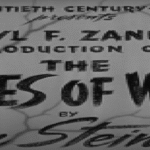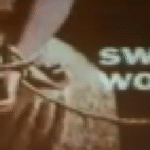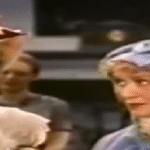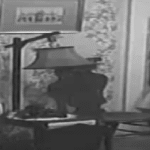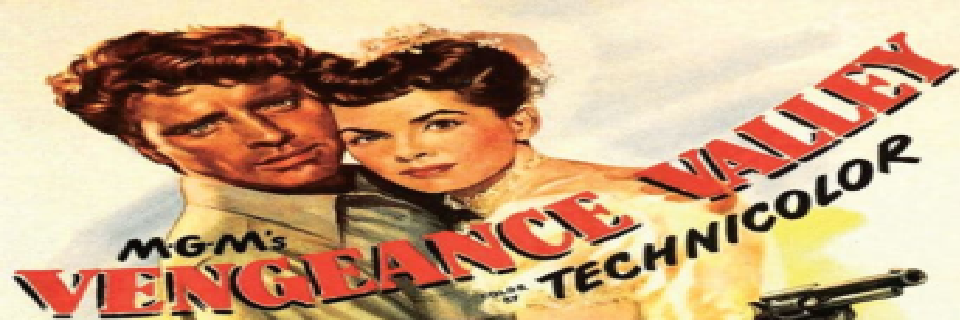Vengeance Valley (1951) is a Western drama that explores themes of loyalty, betrayal, and familial obligation, set against the rugged backdrop of cattle country in the American frontier. Though it carries the classic aesthetic of a traditional Western, with sprawling landscapes and hard-bitten ranch hands, the film’s true conflict lies not in gunfights or outlaws, but in the personal tensions between two men raised as brothers, whose bond begins to unravel under the weight of secrets and resentment.
The story centres on Owen Daybright, the dependable and even-tempered foreman of the sprawling Strobie ranch. He is played with steady calm by Burt Lancaster, whose portrayal of Owen carries a quiet strength, one that garners respect from the men who work under him. Owen is not the owner of the ranch, but he is effectively its backbone. He has been raised since boyhood by Arch Strobie, the ageing patriarch of the family, and treated like a son. Arch’s actual son, Lee Strobie, is a very different sort of man — charming, self-centred, and increasingly unreliable.
As the film opens, Owen is seen helping a young woman named Lily Fasken, who has recently given birth to a child out of wedlock. Quiet and ashamed, Lily has been left to deal with the scandal alone. Owen steps in to provide her with money and support, but not out of personal guilt — he is, in fact, covering for Lee, who is the child’s father. Lily refuses to name Lee publicly, but the truth is known to several people, and the consequences begin to ripple through the community.
The Fasken brothers, brothers of Lily and protective to a fault, assume that Owen is the father, given his involvement, and their resentment quickly builds into a desire for revenge. Meanwhile, Owen continues to shield Lee, partly out of duty to Arch, who still sees his son through rose-tinted glasses, and partly out of a deeply ingrained sense of loyalty, however undeserved. This loyalty is tested repeatedly, as Lee’s behaviour becomes increasingly erratic and cowardly.
Lee has recently returned to the ranch with his wife Jen, a sophisticated woman clearly unsuited to the harsh life of the frontier. She is already disillusioned with her husband’s weakness and dishonesty, and her respect for Owen only underscores Lee’s own sense of inferiority. It’s evident that Lee has been living in Owen’s shadow for years, protected and enabled by a system that favours blood ties over merit. As tensions rise, it becomes clear that Lee is not only shirking responsibility, but actively working to undermine Owen, whom he views not as a brother, but as a rival.
The heart of the film lies in this fraught dynamic. Owen is a man of integrity, but his sense of duty keeps him entangled in a web of lies that are not his own. Lee, on the other hand, is a study in cowardice — desperate to escape consequences, he manipulates those around him, including his wife, his father, and the ranch hands. He fears confrontation and responsibility, yet resents Owen for being everything he is not. That resentment eventually hardens into something more dangerous.
As the Fasken brothers begin to close in, determined to settle the score with Owen, the situation becomes increasingly volatile. Arch remains willfully blind to the truth about his son, clinging to an ideal that no longer exists. Owen, caught in the middle, continues to shield the family name, even as his own life is put at risk. There’s a growing sense that things cannot continue as they are — that some reckoning must come.
The final act of the film sees the tension explode into violence. Lee, seeing a chance to rid himself of Owen once and for all, leads the Faskens into a confrontation, deliberately putting Owen in their path. The betrayal is the final straw for Owen, who is forced not only to defend himself, but also to make peace with the fact that the bond he has tried so hard to preserve has already been broken. What follows is a brutal showdown that lays bare the cost of deceit, pride, and misplaced loyalty.
When the dust settles, Lee is exposed for the coward he is, and Owen, though scarred by the ordeal, emerges as the moral victor. Yet the resolution is not triumphant in the conventional Western sense. There is no celebration, no cathartic release. The damage has been done, and while justice of a sort has been served, it has come at a personal cost. Owen’s decency, once his strength, has been used against him, and he must now reckon with the consequences of protecting a man who never deserved it.
Visually, Vengeance Valley is classic Western cinema, with sweeping shots of cattle drives, rugged hills, and dust-blown towns. But beneath the surface, it is a character-driven drama, more concerned with psychological conflict than external action. The pace is deliberate, allowing the emotional complexity of the characters to unfold gradually. Lancaster’s performance is particularly noteworthy for its restraint — he conveys more through silence and posture than words, embodying a man whose moral code is both his anchor and his burden.
The film avoids melodrama, even as it deals with themes of betrayal and violence. It treats its characters with a certain maturity, acknowledging that right and wrong are not always easy to separate. Owen is a good man, but his silence allows lies to fester. Lee is a scoundrel, but one whose actions are born from weakness rather than malice. There are no villains in the traditional sense, only flawed people caught in a cycle of pride and protection.
In conclusion, Vengeance Valley is a Western that stands out for its emotional depth and moral complexity. It offers a nuanced portrait of family ties strained by jealousy, honour, and deceit. While it contains many of the visual and thematic hallmarks of the genre, its focus remains firmly on character rather than spectacle. Through the story of Owen and Lee, the film explores the limits of loyalty and the painful process of confronting uncomfortable truths. It is a tale not of vengeance in the traditional sense, but of coming to terms with betrayal, and the quiet, unglamorous heroism of doing what is right, even when it hurts.

